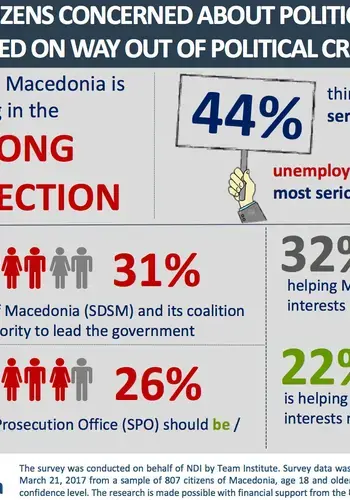Skopje, MACEDONIA - To inform the political parties, opinion leaders and civil society on public opinion, the National Democratic Institute (NDI), with financial support from the United States Agency for International Development, conducted the first in a series of three tracking polls (download PDF polling report) in March 2017. Follow-up surveys will be conducted in April and May of 2017. The methodology and political context are below.
Key Findings
For the first time since the 2001 conflict, the general political situation/political crisis is the most serious problem for citizens of Macedonia. It is followed by unemployment, poverty, economic crisis and the platform signed by the leaders of the ethnic Albanian parties.
Almost two thirds of the respondents believe the country is moving in the wrong direction, while only 8% of the citizens think that the country is moving in the right direction.
The President of Macedonia is the most trusted institution among ethnic Macedonians, while it is the least trusted institution among ethnic Albanians. The Special Prosecution Office (SPO) is the most trusted institution among ethnic Albanians and the second most trusted institution among ethnic Macedonians. The Courts and the Public Prosecution are the least trusted institutions in Macedonia. Almost 60% of citizens think that the mandate of the SPO to prosecute any wrongdoings stemming from the wiretapped conversations should be extended.
While almost two thirds of citizens believe a majority of MPs can form a government, half of the citizens of Macedonia (51%) believe that SDSM and its coalition partners have the authority to lead the government. However, only 40% think that formation of a government by a majority of MPs is legitimate without President Ivanov granting the mandate.
Eight out of 10 citizens of Macedonia (81%) have not read the platform signed by the ethnic Albanian parties.
According to citizens, growing the economy, ending the political crisis, employment, unifying the country and rule of law should be the top five priorities for the new government. The platform signed by the leaders of the ethnic Albanian parties is a priority for only 1.8% of interviewed citizens.
38.8% of ethnic Macedonians and other ethnic groups believe there is no foreign entity that helps promote Macedonia’s national interests, but only 11.6% of ethnic Albanians share this opinion. Approximately one fifth of interviewed citizens believe that the European Union helps Macedonia’s national interests the most, while 9.6% believe the United States of America and 8% think Russia helps Macedonia’s national interests the most. However, there is a significant difference between ethnic Macedonians and ethnic Albanians regarding this issue:
- 41% of ethnic Albanians believe that the EU helps Macedonia’s national interests, while only 15.4% of ethnic Macedonians and other ethnic groups agree.
- 18.2% of ethnic Albanians believe the USA helps the country’s national interests the most, but only 6.9% of ethnic Macedonians concur.
- Among ethnic Albanians, 7.6% think both the US and EU help Macedonia’s interest the most.
- One out of 10 (10.5%) of ethnic Macedonians believe Russia helps Macedonia’s national interests the most. As referenced above, this number drops to 8% when ethnic Albanians are added to the sample because no ethnic Albanian thinks Russia helps Macedonia’s national interests.
Methodology
The survey was conducted on behalf of NDI by Team Institute. Survey data was collected through telephone CATI interviews from March 17th - March 21st, 2017 from a sample of 807 citizens of Macedonia, age 18 and older. The margin of error is + 3.46% at the midrange, with a 95% confidence level. A national representative, multistage stratified sample was used. Households were distributed proportionally in urban and rural areas in all 8 regions of Macedonia, according to the ethnicity of the citizens. The method of next birthday was used for the selection of the respondents, and the proportion of fixed to cellular telephones in the sample was 70% to 30%.
Political Context
Following a wiretapping scandal that embroiled a number of high-ranking officials and resulted in the resignations of the Prime Minister, two cabinet-level officials and the head of the intelligence service, Macedonia held snap parliamentary elections in December 2016 giving a narrow two seat victory to the coalition led by VMRO-DPMNE (51 seats). The coalition led by SDSM garnered support (49 seats) from its traditional supporters as well as non-traditional supporters that included ethnic Albanians.
The negotiation process to form the next government, which requires at least 61 votes in Parliament, was hampered by a platform signed by ethnic Albanian parties - DUI (10 seats) , BESA (5 seats) and the Alliance for Albanians (3 seats). After VMRO-DPMNE and its long-standing coalition partner DUI did not manage to strike a deal to continue its ruling coalition, an agreement was achieved by the opposition SDSM and the parties of the Albanian minority - DUI, BESA and the Alliance for Albanians to form the government. DPA (2 seats) did not sign the platform nor is expected to be in the SDSM-led governing coalition. Despite this agreement, the President of Macedonia Gjorge Ivanov has refused to give the mandate to the SDSM President Zoran Zaev to form the government, citing that "a platform of a foreign country" signed by ethnic Albanian party leaders has the potential to "redefine the unitary character" of Macedonia.
For more information about NDI’s work in Macedonia, visit: www.ndi.org/macedonia.

